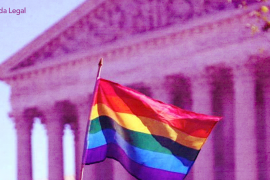The Supreme Court of Hawai‘i yesterday affirmed a lower court ruling that, just like other spouses, same-sex spouses must be treated as the presumed parents of children born during their marriage, with equal rights and equal responsibilities, including legal parentage and child support.
“The Court affirmed that marriage is marriage, with all the rights and responsibilities that come with it,” Lambda Legal Counsel Peter Renn said. “A child does not have fewer rights than other children simply because he has same-sex parents. Families are formed in different ways but the same rule applies: when a married couple brings a child into this world, that child has two legal parents, regardless of their gender. There is no different standard for the marriages of same-sex couples.”
The ruling came in the case of L.C. v. M.G., a dispute between a married same-sex couple regarding whether the non-biological mother, L.C., is a legal parent to their child and thus responsible to pay child support. Lambda Legal represented the biological mother, M.G., who gave birth to a child conceived through assisted reproduction during the couple’s marriage. (The parties are identified only by initials in filings because of court rules regarding parentage cases.)
The Hawai‘i Supreme Court held that it had “no doubt” that “the marital presumption of parentage applies equally to women in same-sex marriages.” It confirmed that, in any family, “a genetic or biological connection is not required for a legal parent-child relationship to exist.” And it affirmed that same-sex spouses have “the same rights, benefits, and protections enjoyed by married heterosexual couples.” “With those rights come responsibilities,” it continued, and “[p]erhaps the greatest of these are the responsibilities of parentage.”
The State of Hawai`i filed a friend-of-the-court brief in the case, arguing that Hawai‘i’s parenting laws apply equally to same-sex couples and pointing out that the Hawai‘i Marriage Equality Act of 2013 sought to put same-sex and different-sex spouses on equal footing, including with respect to parenting.
L.C. and M.G. met in 2010 and married in 2013. From the beginning of their relationship, they talked about starting a family together. M.G. became pregnant in early 2015 through assisted reproduction using anonymous donor sperm, which the couple had jointly selected. In late 2015, however, when M.G. was several months pregnant, the couple’s relationship deteriorated. In 2016, L.C. sought a court ruling that she is not a legal parent to the child and thus not responsible for paying any child support because, among other things, she is not the child’s biological parent.
The lower court held that L.C. was a legal parent and responsible for child support. It held that the marital presumption of parentage applied to same-sex spouses and that L.C. had not rebutted the presumption by showing that she did not consent to the child’s conception. Specifically, the lower court found L.C. was aware that M.G. was undergoing donor insemination, that L.C. did not object to the pregnancy, and that L.C.’s testimony of not consenting to the pregnancy was not credible. L.C. expressed excitement about the pregnancy and gratitude for M.G. carrying their child, repeatedly referred to the child as “our baby,” promised to support their family, and attended pregnancy-related medical appointments.
All five justices of the Hawai‘i Supreme Court unanimously agreed that the marital presumption of parentage applies to same-sex spouses. The justices also agreed that the presumption had not been rebutted, with two justices finding that the evidence failed to show an absence of consent to rebut the presumption, and three justices finding that the absence of consent would not be sufficient to rebut the presumption.





